- Home
- Muriel Jensen
The Heart of the Matter
The Heart of the Matter Read online
Table of Contents
Cover
Dear Reader
Title Page
Dedication
Letter from the Author
Other Books by
Chapter 1
Chapter 2
Chapter 3
Chapter 4
Chapter 5
Chapter 6
Chapter 7
Chapter 8
Chapter 9
Chapter 10
Chapter 11
Copyright
Well, I can sympathize with hero Jason Warfield in Muriel Jensen’s fabulous Yours Truly novel, The Heart of the Matter. For that matter, I can sympathize with the author, too. Many of us could cheerfully subsist on a diet of potato chips, milk shakes, chocolate,…you get the picture. Unfortunately, we’re supposed to eat vegetables (I put tomato on my hamburger!) and grains (there’s flour in doughnuts!) and drink lots of water (what makes diet soda liquid, anyway?). No fun. Except for Jason, who gets to meet heroine Laura Price as part of his “My children and I are going to start eating healthily” regimen. Love, needless to say, is the dessert they get to share.
You’re also going to love brand-new author Lynn Miller’s novel, Is There a Husband in the House? Pregnant-andsingle Dinah Lane was looking for a husband, but the candidates…! Every one was worse than the one before. In fact, the only guy who was interesting at all-very interesting, as a matter of fact—was Will Dennison. The problem was that Will was just passing through town. Any chance Will could be persuaded to settle down—and settle in with her? Personally, I’d put money on it.
Enjoy both these wonderful books, and come back next month for two more books about unexpectedly meeting, dating—and marrying!—Mr. Right. Yours,
Leslie J. Wainger
Senior Editor and Editorial Coordinator
Please address questions and book requests to:
Silhouette Reader Service
U.S.: 3010 Walden Ave., P.O. Box 1325, Buffalo, NY 14269
Canadian: P.O Box 609, Fort Erie, Ont. L2A 5X3
The Heart of the Matter
Muriel Jensen
To the Fourth Monday of the Month Club—Carolyn, Karen, Judy, Ruth and Diane.
I love prime rib, scalloped potatoes, eggs Benedict, Kung Pao Chicken, cheesecake, chocolate, macadamia nuts, Dove Bars.well, you get my drift. Guess who was diagnosed with high blood pressure and high cholesterol and scheduled to see a nutritionist to discuss proper diet? You guessed it.
Our hospital’s nutritionist is a wonderful woman who knows her stuff and does her best to help her patients find healthy food they’ll enjoy and snacks that won’t kill them.
One of the tools she uses to demonstrate nutritional exchanges is the rubber food Jason Warfield encounters in his meeting with Laura Price in The Heart of the Matter. I felt inclined to giggle at the pile of peas, but understood the scientific fact behind the lesson. My fiction-weaving mind, however, went immediately into gear, wondering how a humor-columnist hero who really doesn’t want to be told what and how much to eat would react to a nutritionist heroine determined to put him on the straight and narrow path of good nutrition, particularly when she brings out her rubber food.
He does not react with the same composure I maintained—which is a good thing, because it gave me my story. I hope you’ll find a few laughs in it.
Best,
Muriel Jensen
P.O. Box 1168
Astoria, Oregon 97103
P.S. Macadamia nuts and chocolate together are to die for!
Books by Muriel Jensen
Silhouette Yours Truly
The Heart of the Matter
Harlequin American Romance
Racing with the Moon #414
Valentine Hearts and Flowers #425
Middle of the Rainbow #464
One and One Makes Three #478
The Unexpected Groom #507
Night Prince #522
Make-Believe Mom #534
The Wedding Gamble #549
The Courtship of Dusty’s Daddy #569
Mommy on Board #603
Make Way for Mommy #606
Merry Christmas, Mommy #610
The Comeback Mom #654
The Prince, the Lady & the Tower #669
Christmas in Connecticut #705
Harlequin Superromance
Trust a Hero #422
Bridge to Yesterday #468
In Good Time #512
Candy Kisses #589
Husband in a Hurry #683
Harlequin Historicals
Trust #806
A Bride for Adam #853
1
Dr. Barry Driscoll
Cape Shore Hospital
Farnham, MA 02719
July 23, 1997
Jason L. Warfield
7 Oak Grove Circle
Farnham, MA 02719
Dear Mr. Warfield:
The results of your cholesterol test indicate that your LDLs (low density lipoproteins) exceed healthy limits, and your HDLs (high density lipoproteins) are inappropriately low. We recommend you contact our office for referral to a nutritionist.
Sincerely
Dr. Barry Driscoll
Jase. Buddy.
Went a little further with the tests we took the night you collapsed and found your cholesterol is so high we could spread you on toast. Call Laura Price’s office (she’s here in the hospital) for an appointment before you stroke out without paying up for the Sox game.
Barry
Fate should not require that a man raise three boys and be forced to watch his diet at the same time. One should not be deprived of sugar and fat and then be required to deal fairly with those you hope will support you in your old age.
—“Warfield’s Battles”
Jason Warfield read the hospital’s letter a second time, then made a paper airplane of it and tried to toss it at the open French doors of his office. It didn’t fly.
Accepting that as significant, he pushed away from his desk, stood and went to retrieve the report. He tucked it into his shirt pocket, leaned a shoulder against the doorway and looked out on the view from his second-story balcony.
He saw bright green treetops, and the rooftops or second stories of his neighbors’ homes in this little town on the southern coast of Massachusetts. Beyond the houses was a busy little bay that was home to a small fleet of fishing boats that helped supply cod, mackerel and shellfish to the eastern seaboard. It also harbored a host of summer sailors taking advantage of a cloudless day late in July.
The view was beautiful.
The letter was not.
He guessed that he was having trouble accepting the hospital’s determination because it wasn’t funny. And “funny” was his business.
During his four years as a syndicated humor columnist for the Boston Bugle, he’d found something to laugh about in every area of his life. Even in the midst of his profound grief at the loss of his wife, he’d been able to find humor in raising three boys alone, in being the only male taking part in school bake sales, in evading the social manipulations of friends intent on finding him a “companion,” and in the scores of other situations in which a single father in his thirties found himself.
But there was nothing funny in a situation that endangered the things in life he loved the most—his children and his food.
On a very serious level, he remembered clearly how it had felt when he’d leapt to sink a basket in the Wednesday night pickup game at the Y and felt a sudden and weird dissembling of motor control right after he made the shot. Then the room seemed to tip over, and he experienced a sort of sideways falling sensation while somehow managing to keep his eye on the ball.
He landed on one foot
but couldn’t steady himself, and crumpled to the court as the ball sank into the basket. Then everything went black.
He awoke in the hospital with Barry and his boys leaning over him. Matt and Eric had been crying, and Adam had been struggling manfully to keep his composure.
Tests taken that night had revealed nothing wrong except low blood sugar because he’d missed dinner, picked up the boys from a birthday party and gone directly to the Y.
He remembered now how terrified they’d looked when they’d thought they were going to lose him, too.
He was all they had.
He pulled the report out of his pocket, straightened it out and read it again. All right. He had to make an ap pointment with Laura Price.
But he hated the thought. He didn’t want some muscular Amazon on carrot juice to tell him he couldn’t bring home deli food anymore, that he and the boys couldn’t go to Manny’s Ribs on Friday nights, or that he’d never see another blueberry pie à la mode.
He played basketball because he liked the friends he played with, he liked the competition, the strategies, the blissful luck that could come to bear when he made a shot from an impossible angle and still managed to sink it.
It made him feel that though the world had banged him around, it was still on his side.
But he never played basketball for the health of his cardiovascular system. Now, he supposed, he was going to be bullied into joining a gym or buying some sophisticated piece of equipment that looked like it could launch you to New Jersey if you made the wrong move.
He crumpled the report into a ball, turned sideways and tried a hook shot toward his wastebasket. He missed.
“Your form’s all wrong, Dad.” The boys burst into the room like fireworks, loud, bright, crackling with elemental energy.
They wore jeans and T-shirts emblazoned with Warfield’s Battles, the logo that topped Jason’s column. It had become their summer uniform.
Adam, fourteen, scooped up the paper missile and loped to where Jason stood, assumed the same stance that his youth made somehow more graceful, bent his knees, raised his arm over his head and tossed the “ball.”
It made a perfect arc and landed in the basket. Adam smiled up at him triumphantly. “It’s in the spring in your knees,” he advised. “It gives it a little more push.” He grinned. “Your knees do still bend, don’t they?”
Jason covered his oldest son’s dirt-smudged face with one large hand and pushed him backward. Of all the boys, Adam was most like him physically and emotionally. He had dark hair and eyes and was just beginning to get some height, and he was always looking for the next adventure.
“You’re asking for it,” Jason threatened.
“We won!” Eric, twelve, raised his bat with the glove slung over it. He was a little stockier and had his mother’s blue eyes, as well as a marshmallow heart that was a magnet for stray animals and outcast friends. “Twentysix games in a row.”
“Those kids from the east end are awful.” Six-yearold Matt came to Jason, arms raised. Out of long habit, though the boy was growing gangly, Jason picked him up and slung him onto his hip. Matt had wide dark eyes that held many fears. Jason worried about him and always tried a little harder to let him know he was protected and loved.
“They’re not awful,” Eric disputed, sinking into the burgundy leather sofa that faced Jason’s desk. He laid his bat reverently on the carpet beside him. “They just have too many girls on the team.”
“Girls are no good,” Matt told Jason.
Adam made a scornful sound and sat down beside Eric. “They’re good for some things.”
Jason resumed his chair behind the desk, Matt sprawled backward over him. “Like what?” Matt asked his brother.
Adam propped both feet on the edge of the desk. “Ah, they’re good for…cooking, bra commercials, having sex. What do you think, Dad? You’ve had the experience.”
Jason frowned at his oldest. “I think you’re in danger of ending up on the National Organization of Women’s hit list. Generally…” He struggled for the right words. “Women are just like us. They just look different.”
“Better,” Eric said with a laugh. “Breasts are a good thing.”
Jason had difficulty taking issue with that. “That’s true. Women arc great to look at. But there’s a lot more to them that you come to understand only when you stop thinking about how pretty they are.”
Adam looked doubtful. “Is that possible?”
Jason shrugged. “It takes a lot of self-control, but it can be done.”
“And what do you learn about them when you stop thinking about their breasts?” Eric wanted to know.
There should be training for this, Jason thought, and it should start the moment a man learns he’s going to become a father. “You learn that their brains are beautiful, too,” he said. “That they’re often smarter than we are, that the impression they give of softness and gentleness usually covers a toughness and a determination that could make Stallone run the other way.”
“What’s it like to have sex with one?” Eric asked, “You and Mom did have sex, didn’t you?”
Adam backhanded him in the gut. “How do you think we got here?”
Eric backhanded him in return. “I keep hoping you were adopted.”
“Hey,” Jason said mildly. “No blood, please. You know how that upsets Mrs. Fregoza. Having sex with your wife is a wonderful and magical thing that’s too intimate and personal to even discuss with her children.”
The four of them stared at nothing for a moment, each trapped in his own memories of Lucy Warfield. She’d been gone for four years.
“What about if the woman isn’t your wife?” Eric asked. “Like Mr. Beaudry across the street who has all those girlfriends?”
Jason realized this was all beyond him, but there was no one else around to provide an answer. So he tried to think it through. “I guess that can be pretty wonderful, too. But sex has a different dimension when it’s shared with someone you love who you know is going to be there forever. It means more. It changes you.”
Matt studied him moodily. “But Mom wasn’t there forever. I mean…she died.”
Jason struggled for equanimity. Pain resurfaced at the damnedest moments—like when he saw Lucy’s wit and questioning mind in the eyes of the children she’d left behind.
“Well, see, that’s the difference.” He swallowed and put a hand to his heart, right next to Mathew’s head. “She’ll be here forever. And because the love we shared meant so much to both of us, and created the three of you, it’ll last me forever—even if she isn’t physically here.”
Matt sat up and looped his arms around his neck. “You mean you’re never gonna get another wife?”
Jason shrugged. “I don’t think so, but you can never be sure about things like that. Sometimes the unexpected happens.”
“And if some woman did fall in love with Dad.” Eric made it sound like that eventuality was pretty slim. “She’d have to want to have three kids, too.”
“Well, that would be okay, wouldn’t it?” Matt asked gravely. “‘Cause then she wouldn’t have to do it herself. Ross Wurthner says it really hurts ‘cause this big baby has to come out of.”
Eric put both hands over his ears. “We know, we know! But let’s not talk about it!”
Adam stood abruptly. “Can we go to Manny’s Ribs for lunch?” he asked. “I’m starving.”
The other boys seconded the request, the boobs and babies discussion dismissed for the moment.
Jason agreed and sent them to wash and change clothes, more than willing to concentrate on other things. Like tasting the succulent bourbon-basted ribs for perhaps the last time.
Laura Price ate a cup of peach yogurt at her desk while reading the paper. She had half an hour between clients, and was doing her best to catch up on the local news.
She read the comics, checked out her horoscope, then turned to “Diane’s Kitchen” on the Life section’s back page. The healthy-cooking column appea
red two days a week and shared space with “Quilting Tips,” which also ran two days. “Warfield’s Battles” took the quarter-page spot on the other three days.
Laura saved and copied the recipes to distribute to her exercise class, and always checked the quilting advice, because her first project, a baby quilt, was going very slowly. But she always made a point of skipping Warfield’s take on living single in the nineties. Though he seemed to be becoming a national icon, she found the columnist glib, self-important and condescending about many of the aspects of modern life she believed in.
Friends and co-workers were always reading aloud from his column and telling her how insightful he was, how sharply on target when he lampooned the trends and passions of the decade. She couldn’t see it.
To her, laughing at discoveries made in the health field was Neanderthal, particularly when the laughter in question was responsible for shaping the attitudes of his three young children, who often appeared in his column.
She considered it ironic that he was her one o’clock appointment. She hated to approach any patient with a sense of futility, but she had a feeling Warfield was a lost cause, personally and professionally. Because his humor seemed to be built on a foundation of gripping honesty—or so everyone told her—she guessed he truly did indulge in the excesses he sometimes wrote about. Turning over a new leaf would destroy a good forty percent of his sources for material. He could no longer poke fun at the public outcry over morbidly unhealthy theater popcorn or Chinese food dishes, mock the new light desserts, chuckle over fat substitutes or jeer at the emphasis on exercise.

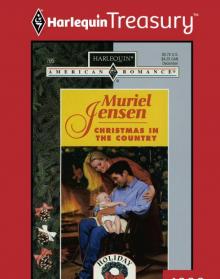 Christmas In The Country
Christmas In The Country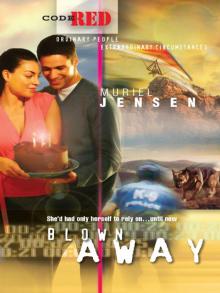 Blown Away
Blown Away In My Dreams
In My Dreams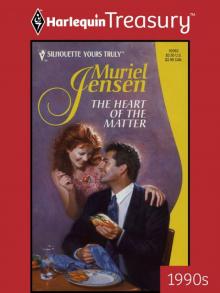 The Heart of the Matter
The Heart of the Matter New Year's Wedding
New Year's Wedding Always Florence
Always Florence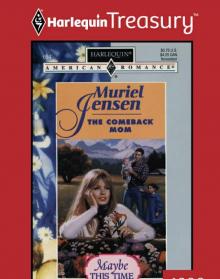 The Comeback Mom
The Comeback Mom To Love and Protect
To Love and Protect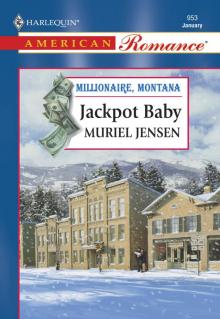 Jackpot Baby
Jackpot Baby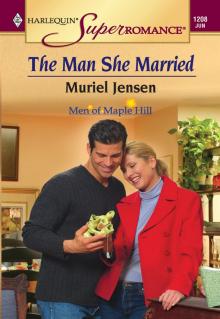 The Man She Married
The Man She Married Love Me Forever
Love Me Forever